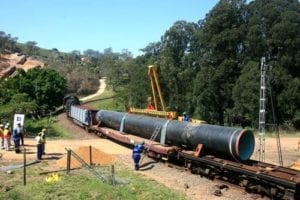Work on the Western Aqueduct, Durban’s biggest ever bulk water pipeline project, is gathering momentum – with the help of a grand old steam locomotive dating back to the 1930’s.
Over the past weekend – and for a number to come – the Umgeni Steam Railway has loaned Cycad Construction a Class 19 D locomotive to haul 40 massive 18-metre long pipes to appropriate points along the seven kilometre pipeline route which extends from Inchanga Station to Alverstone Neck. The huge pipes, which each weigh nine tonnes and have a 16 000 mm diameter, were trucked to Inchanga Station from a pipe yard in Cato Ridge. From there, each pipe was individually loaded on to an innovative special bogie consisting of two carriage chassis that was specially built for the task by Cycad Construction. Project Manager, Martin Bright, said eThekwini Water and Sanitation (EWS) had approached Umgeni Steam Railway when it was discovered that moving the pipes up the steep slope to the construction site would not only be dangerous but would also require expensive, specialised equipment. As the stretch of railway line operated by the Umgeni Steam Railway runs alongside the pipe corridor, this was a much safer and viable option. The original plan was to move the pipes using a diesel locomotive. However, according to Marc Bouchier, treasurer of the Umgeni Steam Railway, it was soon discovered that this was too small and the process would be too slow. The steam locomotive was substituted and proved to be powerful enough to transport the massive pipes without much effort. Bouchier said that the actual hauling of the pipes had taken place over weekends as those who operated the locomotive were all volunteers and could only tackle the task after hours. Payment for shifting the Western Aqueduct pipes will go towards the refurbishment of the Umgeni Steam Railway’s main locomotive which was taken out of service 18 months ago after 15 years of hard work. Built in 1912, she is known as a mountain locomotive as she was specially designed for what was then known as the Natal line which has a particularly steep gradient. The partial restoration is expected to cost more than R600 000.The WACJV Consultants said that the Umgeni Steam Railway locomotive may be called in to move pipes to other points along the pipeline route as this mega infrastructure project progressed.
The Western Aqueduct bulk water pipeline is essential for providing Durban with an assured, sustainable supply of water and is expected to add an additional 400Mℓ/day to the supply to the western regions of the city. The first phase of the Western Aqueduct which covered 19km from Umlaas Road to Inchanga Station was commissioned in June 2011. The second phase, which covers 55km, stretches from Inchanga Station to Ntuzuma. Cycad Pipelines was awarded the first contract for the 7km stretch between Inchanga Station and Alverstone Neck in March. A second contract for the segment of the pipeline that begins at Alverstone Nek and continues to Ashley Drive in Hillcrest was awarded to local company, WK SA Construction. Construction has commenced on this section of the Western Aqueduct steel pipeline. The Western Aqueduct is expected to be complete in 2017.







